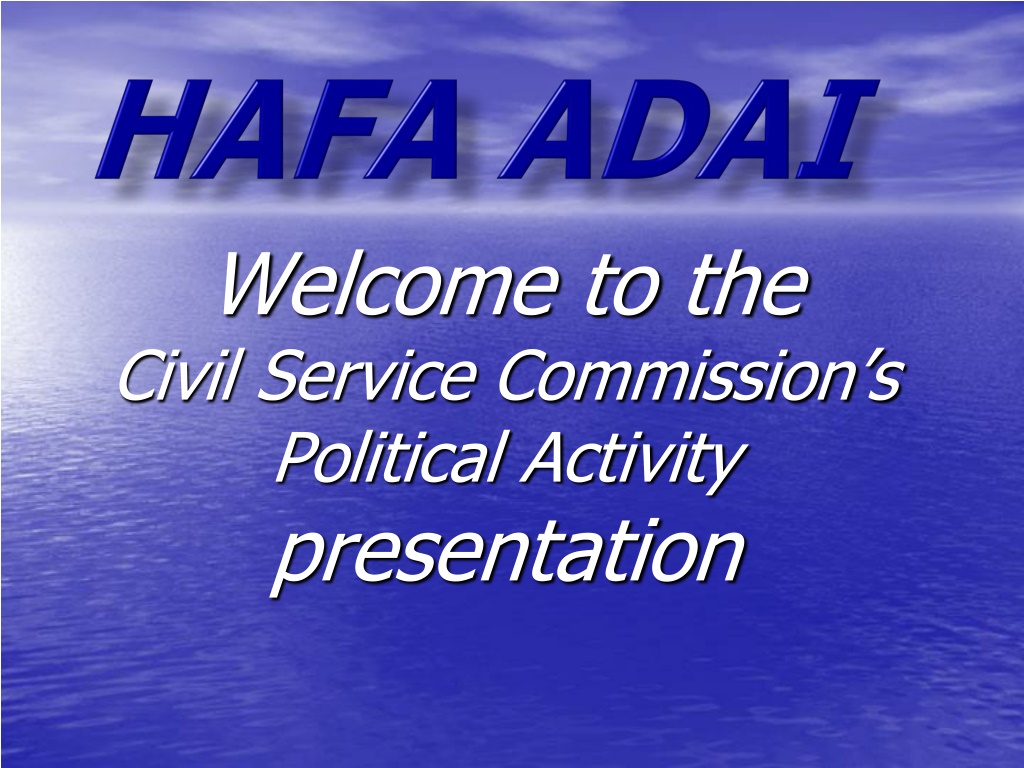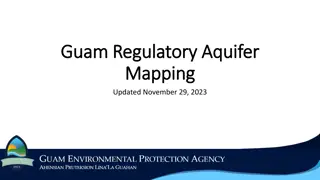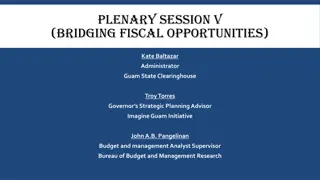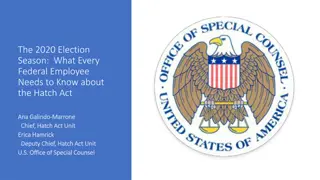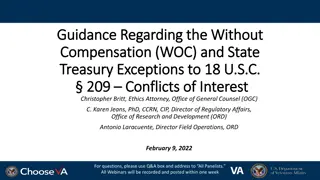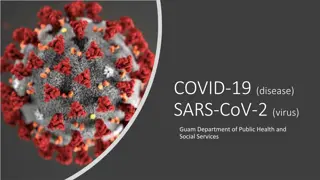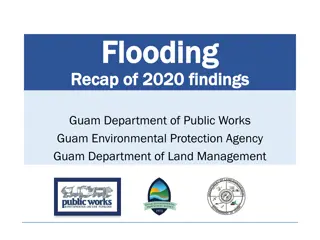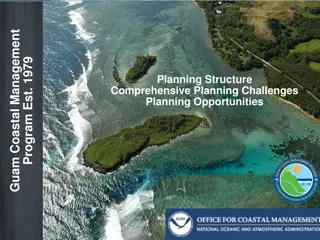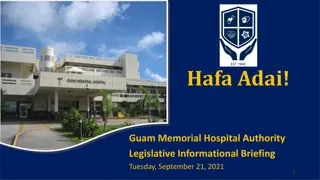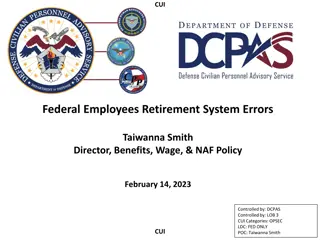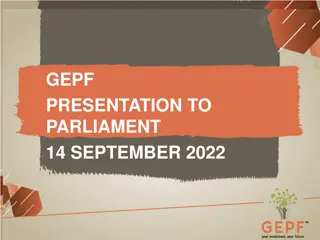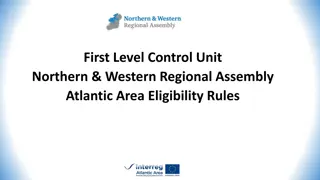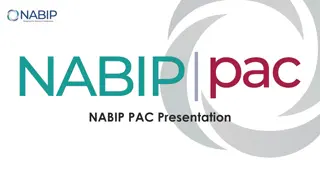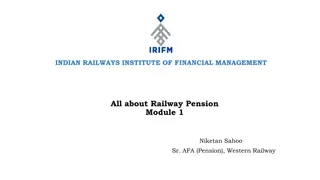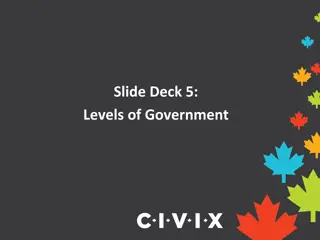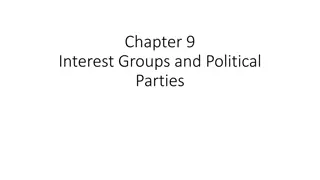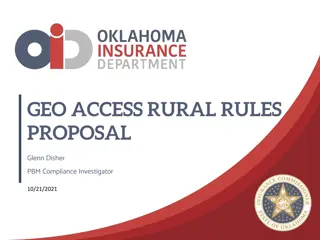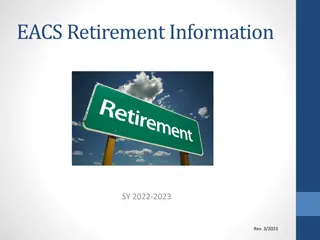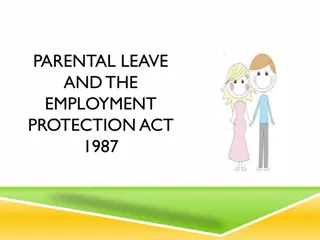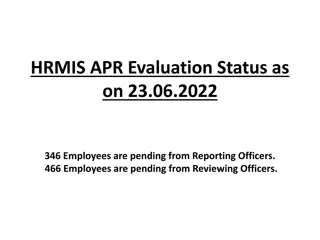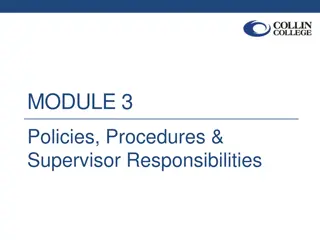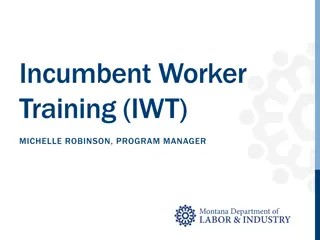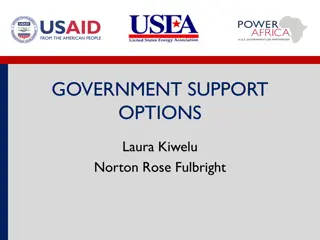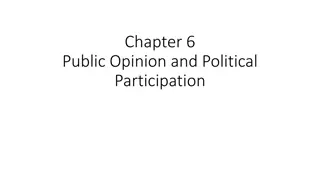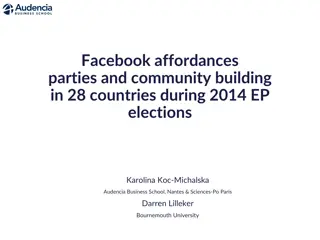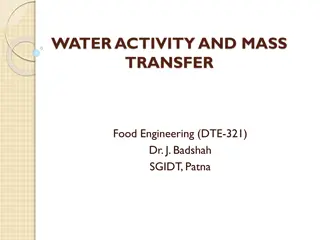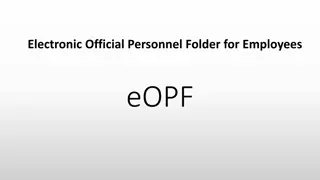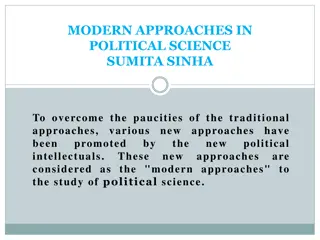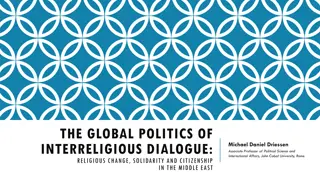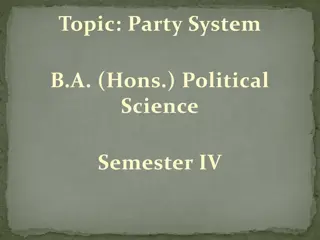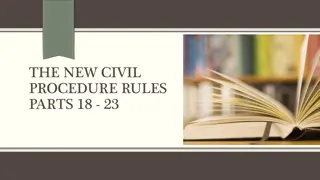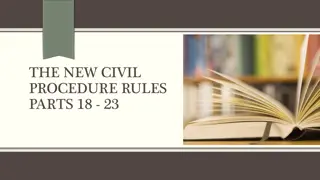Understanding Political Activity Rules for Government Employees in Guam
Explore the guidelines and regulations regarding political activity for government employees in Guam. Learn about the amendments made to Chapter 5, the coverage of the law, exceptions, and prohibited activities. Gain insights to ensure compliance and understanding of the rules.
Download Presentation

Please find below an Image/Link to download the presentation.
The content on the website is provided AS IS for your information and personal use only. It may not be sold, licensed, or shared on other websites without obtaining consent from the author. Download presentation by click this link. If you encounter any issues during the download, it is possible that the publisher has removed the file from their server.
E N D
Presentation Transcript
Welcome to the Civil Service Commission s Political Activity presentation
Roland P. Fejarang Personnel Management Administrator Eric D. Miller Administrative Counsel Daniel D. Leon Guerrero Executive Director and The Staff of the CIVIL SERVICE COMMISSION
DISCLAIMER This presentation is brought to you by the staff of the Civil Service Commission to assist personnel of government of Guam agencies and department s to follow the law and the rules in regards to Political Activity. Please note, nothing presented or said here is binding on the Commission.
On June 15, 2012, Chapter 5, Political Activity was amended by Public Law 31- 217, which removed many prohibitions formerly in place for most government of Guam employees.
Who is Covered? (a) Employee means a person employed in the Executive Branch of the government of Guam, including autonomous and semiautonomous agencies thereof, or in the Judicial Branch (cited in part) This law applies to all classified and unclassified employees of the above two (2) branches of government.
Who is not Covered? with the following exceptions (cited in part) (1) A person holding elective office; (2) A special or Staff Assistant to the Governor; (3) A person appointed by the Governor with the consent of the Legislature; (4) A person retained from time to time to perform professional or special services for a specific fee; and (5) A person working on a casual basis on the days he performs no services.
TRUE or FALSE A less restrictive, unclassified employee may be a candidate in a partisan election.
CORRECT ANSWER FALSE
4 GCA 5103 Prohibited Activity (4) Being a candidate;
Activity (c) Activity means the independent action of an employee, the action of an employee in open or secret cooperation with others and the indirect action of an employee through an agent. Activity does not mean the independent action of the husband or wife of an employee, upon his or her own initiative and in his or her own behalf;
PERMITTED ACTIVITY (a) An employee may engage in political activity to the fullest extent consistent with the restrictions set forth in 5103, so long as such activity does not materially compromise his efficiency or integrity as an employee, or the neutrality, efficiency or integrity of his department or agency. Each employee specifically retains the right to register and vote in an election and, while not on duty and while not in a uniform identifying him as an employee, to:
(1) Express his opinion as an individual citizen privately and publicly on political issues and candidates; (2) Display a political picture, sticker or badge or button; (3) Participate in the non-partisan political activities of a civic community, social labor, professional or similar organization; (4) Be a member, officer, or delegate of a political party or other political organization and participate in its activities to the fullest extent consistent with 5103; (5) Attend a political convention, rally, fund-raising function, or other gathering;
(6) Sign a political petition as an individual citizen; (7) Make, as an individual citizen, a contribution to or expenditure on behalf of a political party or organization or candidate; (8) Be free from any obligation to contribute to any political fund or to render any political service; (9) Participate in political activity in connection with a question not specifically identified with a political party: for example, soliciting signatures for petition relative to changing working conditions or campaigning for an issue in a referendum; and (10) Serve as member of a precinct board or other election official who performs duties under Title 3 GCA.
Restricted Employees (b) Employees of the following government entities are prohibited from taking an active part in political management or political campaigns: (1) the Guam Election Commission; (2) the Civil Service Commission; (3) the Office of Public Accountability; (4) the Criminal Investigation Unit of the Tax Enforcement Division of the Department of Revenue and Taxation; (5) the Sworn police officer; and (6) the Prosecution Division of the Office of the Attorney General. For the purposes of this Section, the term active part in political management or in a political campaign means to campaign for or against candidates, or otherwise engage in political activity in concert with a political party, a candidate for partisan political office, or a partisan political group.
Prohibited Activity (a) An employee shall not use his official authority or influence for the purpose of interfering with or affecting the result of an election. (b) Specific activities in which employees are prohibited from participating include, but are not limited to:
(1) soliciting, collecting, handling, disbursing or accounting for assessments, contributions or other funds for a political party, partisan political organization or candidate; (2) organizing, selling tickets to, seeking support for or actively participating in a fund-raising activity of a political party, partisan political organization or candidate; (3) taking an active part in managing the political campaign of a candidate; (4) being a candidate; (5) discharging, promoting, demoting or changing the compensation of any other employee or promising or threatening to do so, because said other employee advocates or fails to advocate through contribution, voting or otherwise, a candidate; and (6) using government travel allowances, government transportation, government supplies or government facilities for the benefit of any political party, partisan political organization or candidate.
The Political Activity law allows more voluntary participation regarding political activities, on the employees part. For those in the less restrictive group which is the majority of the government work force.
THINGS TO REMEMBER Although as a less restricted employee you may now participate in partisan elections, you should never do so while wearing a government of Guam uniform or official insignia. Never use your official title or position while engaged in political activity, or while on duty at work. Never invite subordinate employees to political events. All government employees shall be free from any obligation to participate or contribute to any political fund or to render any political service.
TRUE or FALSE A less restrictive employee may take annual leave to participate in an organized street wave for a particular candidate.
CORRECT ANSWER TRUE
4 GCA 5102 (5) Attend a political convention, rally, fund- raising function, or other gathering;
TRUE or FALSE A less restrictive employee may display a huge sign on the back of their truck bed for a candidate running for office.
CORRECT ANSWER TRUE
4 GCA 5101 (1)Display a political picture, sticker or badge or button;
Investigations by the Civil Service Commission When any person has reason to believe that an employee has violated 5103, he may report the matter to the Civil Service Commission. On receipt of a written report which seems to warrant an investigation, the Commission may investigate the matter in accordance with the provisions of the rules and procedures, if any, established by the Civil Service Commission and the following: the Commission to
(a) All hearings shall be conducted before the entire Commission; and (b) The decision of the Commission shall include a determination of whether a violation of 5103 has occurred and whether a violation warrants the removal of the employee from his employment. Should the Commission determine that removal is not warranted but that a violation of 5103 did occur, a penalty of not more than thirty (30) days suspension without pay shall be imposed at the direction of the Commission.
PROCESS OF THE INVESTIGATION Written complaint Staff Assessment report before the Board of Commissioners (to determine to approve an investigation or not into the matter) Staff Investigation report before the Board of Commissioners (to determine to approve or disapprove the investigation findings or not on the matter) Appeal for Judicial review
Written complaint Assessment Report Investigation Report Alleged Incident Judicial Review CSC Decision MINI HATCH FLOW CHART 30
SI YUOS MAASE! QUESTIONS
4 GCA PUBLIC OFFICERS & EMPLOYEES CH. 5 INVESTIGATIONS BY CIVIL SERVICE COMMISSION 1 CHAPTER 5 POLITICAL ACTIVITY 5101. Definitions. 5102. Permitted Activity. 5103. Prohibited Activity. 5104. Activities Not Affected. 5105. Investigations by Civil Service Commission. 5106. Other Restrictions: Penalty. 5101. Definitions. In this Chapter: (a) Employee means a person employed in the Executive Branch of the government of Guam, including autonomous and semiautonomous agencies thereof, or in the Judicial Branch with the following exceptions: (1) A person holding elective office; (2) A special or Staff Assistant to the Governor; (3) A person appointed by the Governor with the consent of the Legislature; (4) A person retained from time to time to perform professional or special services for a specific fee; and (5) A person working on a casual basis on the days he performs no services. Employees includes a person on administrative annual, or sick-leave unless such person has resigned and has received a lump-sum payment for such leave. Subject to (5) above, it includes persons not providing professional services for a specific fee who are hired on a temporary, part-time, emergency or casual basis; (b) Election means any local, primary, general or special election; (c) Activity means the independent action of an employee, the action of an employee in open or secret cooperation with others and the indirect action of an employee through an agent. Activity does not mean the independent action of the husband or wife of an employee, upon his or her own initiative and in his or her own behalf;
(d) Political Party means a national political party, a territorial political party and an affiliated organization; (e) Partisan and non-partisan when used as adjectives refer to political parties; and (f) Candidate means: (1) an individual as defined in 3 GCA '8101, Subsection (b); and (2) a candidate for an office in a political party. 5102. Permitted Activity. (a) An employee may engage in political activity to the fullest extent consistent with the restrictions set forth in 5103, so long as such activity does not materially compromise his efficiency or integrity as an employee, or the neutrality, efficiency or integrity of his department or agency. Each employee specifically retains the right to register and vote in an election and, while not on duty and while not in a uniform identifying him as an employee, to: (1) Express his opinion as an individual citizen privately and publicly on political issues and candidates; (2) Display a political picture, sticker or badge or button; (3) Participate in the non-partisan political activities of a civic community, social labor, professional or similar organization; (4) Be a member, officer, or delegate of a political party or other political organization and participate in its activities to the fullest extent consistent with 5103; (5) Attend a political convention, rally, fund-raising function, or other gathering; (6) Sign a political petition as an individual citizen; (7) Make, as an individual citizen, a contribution to or expenditure on behalf of a political party or organization or candidate; (8) Be free from any obligation to contribute to any political fund or to render any political service; (9) Participate in political activity in connection with a question not specifically identified with a political party: for example, soliciting signatures for petition relative to changing working conditions or campaigning for an issue in a referendum; and (10) Serve as member of a precinct board or other election official who performs duties under Title 3 GCA. (b) Employees of the following government entities are prohibited from taking an active part in political management or political campaigns: (1) the Guam Election Commission; (2) the Civil Service Commission; (3) the Office of Public Accountability; (4) the Criminal Investigation Unit of the Tax Enforcement Division of the Department of Revenue and Taxation; (5) the Sworn police officer; and
(6) the Prosecution Division of the Office of the Attorney General. For the purposes of this Section, the term active part in political management or in a political campaign means to campaign for or against candidates, or otherwise engage in political activity in concert with a political party, a candidate for partisan political office, or a partisan political group. 5103. Prohibited Activity. (a) An employee shall not use his official authority or influence for the purpose of interfering with or affecting the result of an election. (b) Specific activities in which employees are prohibited from participating include, but are not limited to: (1) soliciting, collecting, handling, disbursing or accounting for assessments, contributions or other funds for a political party, partisan political organization or candidate; (2) organizing, selling tickets to, seeking support for or actively participating in a fund-raising activity of a political party, partisan political organization or candidate; (3) taking an active part in managing the political campaign of a candidate; (4) being a candidate; (5) discharging, promoting, demoting or changing the compensation of any other employee or promising or threatening to do so, because said other employee advocates or fails to advocate through contribution, voting or otherwise, a candidate; and (6) using government travel allowances, government transportation, government supplies or government facilities for the benefit of any political party, partisan political organization or candidate. 5104. Activities Not Affected. Nothing in this Chapter shall preclude the use under a rental agreement of government of Guam facilities by a political party, partisan political organization or candidate. 5105. Investigations by Civil Service Commission. When any person has reason to believe that an employee has violated 5103, he may report the matter to the Civil Service Commission. On receipt of a written report which seems to the Commission to warrant an investigation, the Commission may investigate the matter in accordance with the provisions of the rules and procedures, if any, established by the Civil Service Commission and the following:
(a) All hearings shall be conducted before the entire Commission; and (b) The decision of the Commission shall include a determination of whether a violation of 5103 has occurred and whether a violation warrants the removal of the employee from his employment. Should the Commission determine that removal is not warranted but that a violation of 5103 did occur, a penalty of not more than thirty (30) days suspension without pay shall be imposed at the direction of the Commission. 5106. Other Restrictions: Penalty. No person, whether or not an employee, shall solicit or receive a contribution or distribute literature for any political purpose in any room or building occupied in the discharge of official duties by any person employed by the Executive, Legislative or Judicial Branches of the government of Guam. For purposes of this Section, soliciting a contribution includes solicitation by letter or circular addressed to and delivered to an employee in said room or building. Any person who violated this Section is guilty of a misdemeanor. Website information; http://www.guamlegislature.com http://www.justice.gov.gu/compileroflaws/GCA/title4.html
